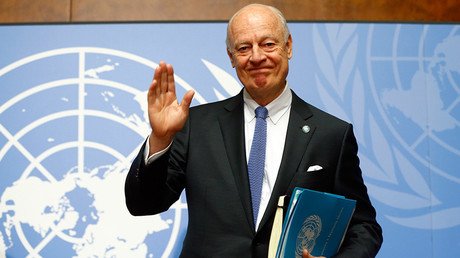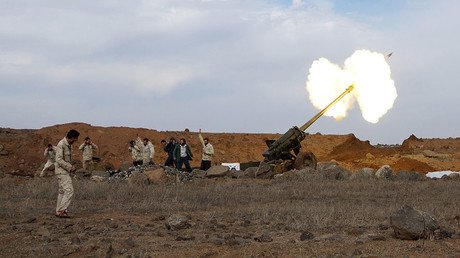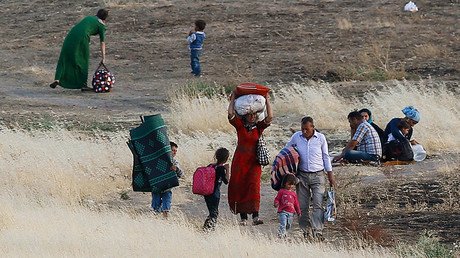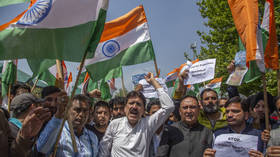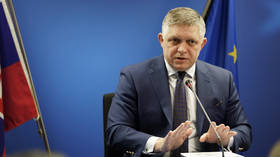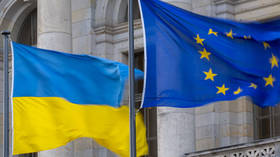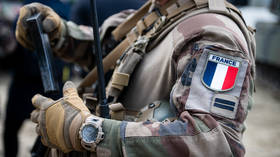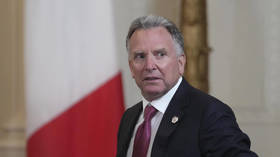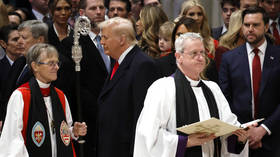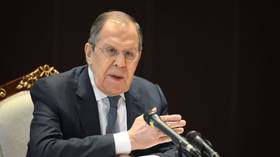‘Miracle ceasefire’ must be fostered as one and only plan for Syria – UN envoy de Mistura to RT
The only possible solution to the Syrian crisis remains an implementation of the “miraculous” ceasefire, brokered by Russia and US who now bear responsibility to protect it and “recalibrate” cessation of hostilities, UN envoy for Syria Staffan de Mistura told RT.
RT: We’ve seen reports of deadly airstrikes on a hospital in Aleppo. The fighting has intensified in recent days. What can be done to make sure the sides abide by the truce that was put in place two months ago and appeared to be working initially?
Staffan de Mistura: It did, indeed. And it was a small, but a very special miracle. And by the way it was an unexpected and very welcome miracle created by a discussion taking place at the high level between the Russian Federation and the USA. And they are the ones who actually announced together that there was going to be a cessation of hostilities, which was then blessed by the Security Council and by the 20 countries of the ISCG. And it lasted almost 60 days and the casualties went close to zero.
So what can be done? Well, first there must be more clarity on what are the divisions between what the UN Security Council has defined as terrorists – Al-Nustra and Daesh – and other groups which are being associated with them but, in fact, are not part of the terrorist groups.
Secondly, how to make sure when there is an incident, there is no snowball effect and all an excessive response which then produces another excessive response. For instance, airstrikes which are inaccurate, or terribly deadly. Look what happened on the hospital in Aleppo.
Bottom line, I did send a message, a very heartfelt message, to both the Russian and the American leadership to say: “You own this cessation of hostilities, you’re the ones who produced it. So President Putin, President Obama, you came up with a remarkable achievement – protect it, make sure that it doesn’t disappear. Do agree again on how this cessation of hostilities doesn't lose its energy, because it is in danger.”
RT: Going back to the peace talks, the main opposition bloc walked out during the peace talks. So what are the chances that negotiations may resume in May and is it possible that the decision to walk out was influenced by some other party, perhaps, Saudi Arabia?
SM: As far as I am concerned, the talks really never got interrupted. The proof is that we continued with the talks until the very day when I had indicated we were going to end them, which was a few days ago on the 23rd. And we started on the 13th. The [Saudi-backed High Negotiations Committee], the opposition HNC did decide publicly to walk out, but did leave some technical experts, and we were able to continue to talk. And we had very in-depth talks and discussions, also proximity talks with the government, and other platforms like the Moscow-Cairo [formed Syrian opposition group].
Bottom line, as far as I am concerned, the real danger for the talks is what the Syrians are telling us. And they are telling us: “You can have all the conferences you want, but what we need now is to have a ceasefire, a cessation of hostilities as a reassuring point,”
By the way, that’s not a discovery. Look at what’s happening at Yemen at the moment. First, a cessation of hostilities, which needs to hold and in coincidence with that – sufficient atmosphere for people to believe that it was worth negotiating. It will take time, but it will take time without bombing hospitals, aerial bombing taking place and killing Syrian people. Have you seen how many people there’ve been killed in the last 48 hours? One every 25 minutes.
RT: Recently, so-called plan B was announced by the US government should the ceasefire collapse. Now, that includes military action. What can you make of that? Do you support military involvement if the talks fail?
SF: Well, first of all I have not heard about any detailed plan B. I don’t think a real plan B exists. There is only a plan A, and the plan A is a political transition based on the Geneva communique and on resolution 2254 [Peace plan for Syria] and a political process.
There is no military solution to this conflict. There’s been an attempt for five years to have victory and a defeat. There is no victory or defeat on this. There is only a political solution, which means a negotiation. But negotiation needs to have a ceasefire. So we go back to my appeal.
RT: Russia insists that Kurds need to be included in the peace talks as they are a major force in fighting Islamic State and the largest ethnic group minority in Syria. Why are they not present at the talks?
SF: Well, there are many reasons. One certainly reason which is complicating substantially their possibility of participating at this stage of the talks had been their own declaration of a federal state which even the government in Damascus felt very strongly about. You know, in the Arab world the word “federal” has a very special connotation. It has the meaning of partition, and that alone, can make everyone extremely wary.
I can tell you one thing. The Kurdish Syrian people are Syrian people. So one way, or the other, the Syrian Kurds need to be associated in the future of their own country. But of course, we have to go through also this type of complications I’ve mentioned to you.
RT: Three months of talks brought little progress. How much more are the sides willing to negotiate before they run out of patience?
SF: In a conflict of five years where 4 million people are refugees, and perhaps between 300,000 and 400,000 have been killed and 1 million wounded, I think we need a lot of strategic patience in order to make sure that this doesn’t continue for another five years. And I think the key has been when the Russian Federation and the US started talking concretely about the fact that there is no military solution.
So I believe that we do have a window and that window needs to be taken up now. And, by the way, we even have a timetable. It has been decided by the Security Council that we 18 months maximum for the next elections, which are presidential elections and are parliamentary elections with the UN supervision and a new constitution and a transitional government. And that is exactly what we were stating and we intend to continue talking about.
RT: There are so many interests in Syrian involvement, so many parties with their own interests and they seem to be changing their agenda. How can you reconcile all of them?
SF: Well, now you are touching [on] what is considered the mission most complicated in the world so far.
I’ve been with the UN for 45 years ... and I’ve never seen a conflict which has become so complicated by so many countries and so many entities involved in it. But that should not stop us from actually pushing ahead, particularly now that we have a window of opportunity. We do have a contact group. We have the Russians and the Americans talking seriously about it. We have a contact group with every country involved from Turkey to Saudi Arabia, to Iran to Qatar. Everyone else is in it. And on top of it, we do have a special control room in Geneva to try to control the facts when the ceasefire has a problem. So we have a critical mass.
Plus the Syrian people can't wait any more. In my opinion, the window is now. And you know what? We are forgetting it and you didn’t mention it, and I did not yet mention it, but behind all of this is Daesh, ISIS who are waiting to take advantage of the hesitation of international community in order to do what they did in Palmyra which, luckily, have been liberated. But they are still in Raqqa. So all that can be a push in the right direction on one condition – we recalibrate cessation of hostilities. The focus now should be now on the political process and fighting Daesh.
The statements, views and opinions expressed in this column are solely those of the author and do not necessarily represent those of RT.
